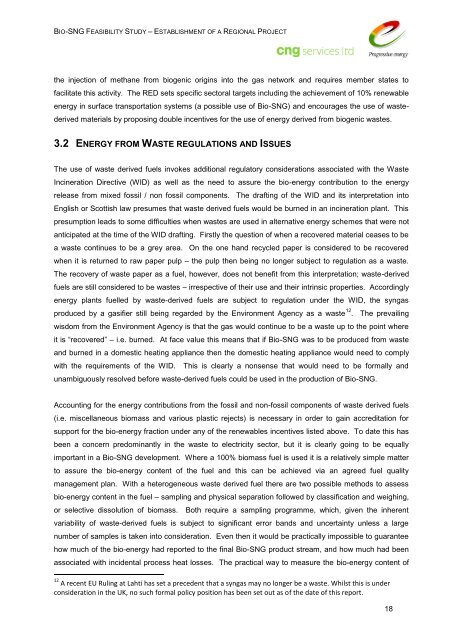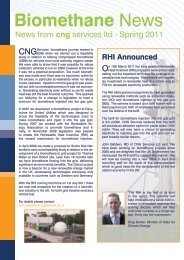Bio-SNG - CNG Services
Bio-SNG - CNG Services
Bio-SNG - CNG Services
You also want an ePaper? Increase the reach of your titles
YUMPU automatically turns print PDFs into web optimized ePapers that Google loves.
BIO-<strong>SNG</strong> FEASIBILITY STUDY – ESTABLISHMENT OF A REGIONAL PROJECTthe injection of methane from biogenic origins into the gas network and requires member states tofacilitate this activity. The RED sets specific sectoral targets including the achievement of 10% renewableenergy in surface transportation systems (a possible use of <strong>Bio</strong>-<strong>SNG</strong>) and encourages the use of wastederivedmaterials by proposing double incentives for the use of energy derived from biogenic wastes.3.2 ENERGY FROM WASTE REGULATIONS AND ISSUESThe use of waste derived fuels invokes additional regulatory considerations associated with the WasteIncineration Directive (WID) as well as the need to assure the bio-energy contribution to the energyrelease from mixed fossil / non fossil components. The drafting of the WID and its interpretation intoEnglish or Scottish law presumes that waste derived fuels would be burned in an incineration plant. Thispresumption leads to some difficulties when wastes are used in alternative energy schemes that were notanticipated at the time of the WID drafting. Firstly the question of when a recovered material ceases to bea waste continues to be a grey area. On the one hand recycled paper is considered to be recoveredwhen it is returned to raw paper pulp – the pulp then being no longer subject to regulation as a waste.The recovery of waste paper as a fuel, however, does not benefit from this interpretation; waste-derivedfuels are still considered to be wastes – irrespective of their use and their intrinsic properties. Accordinglyenergy plants fuelled by waste-derived fuels are subject to regulation under the WID, the syngasproduced by a gasifier still being regarded by the Environment Agency as a waste 12 . The prevailingwisdom from the Environment Agency is that the gas would continue to be a waste up to the point whereit is “recovered” – i.e. burned. At face value this means that if <strong>Bio</strong>-<strong>SNG</strong> was to be produced from wasteand burned in a domestic heating appliance then the domestic heating appliance would need to complywith the requirements of the WID. This is clearly a nonsense that would need to be formally andunambiguously resolved before waste-derived fuels could be used in the production of <strong>Bio</strong>-<strong>SNG</strong>.Accounting for the energy contributions from the fossil and non-fossil components of waste derived fuels(i.e. miscellaneous biomass and various plastic rejects) is necessary in order to gain accreditation forsupport for the bio-energy fraction under any of the renewables incentives listed above. To date this hasbeen a concern predominantly in the waste to electricity sector, but it is clearly going to be equallyimportant in a <strong>Bio</strong>-<strong>SNG</strong> development. Where a 100% biomass fuel is used it is a relatively simple matterto assure the bio-energy content of the fuel and this can be achieved via an agreed fuel qualitymanagement plan. With a heterogeneous waste derived fuel there are two possible methods to assessbio-energy content in the fuel – sampling and physical separation followed by classification and weighing,or selective dissolution of biomass. Both require a sampling programme, which, given the inherentvariability of waste-derived fuels is subject to significant error bands and uncertainty unless a largenumber of samples is taken into consideration. Even then it would be practically impossible to guaranteehow much of the bio-energy had reported to the final <strong>Bio</strong>-<strong>SNG</strong> product stream, and how much had beenassociated with incidental process heat losses. The practical way to measure the bio-energy content of12 A recent EU Ruling at Lahti has set a precedent that a syngas may no longer be a waste. Whilst this is underconsideration in the UK, no such formal policy position has been set out as of the date of this report.18









